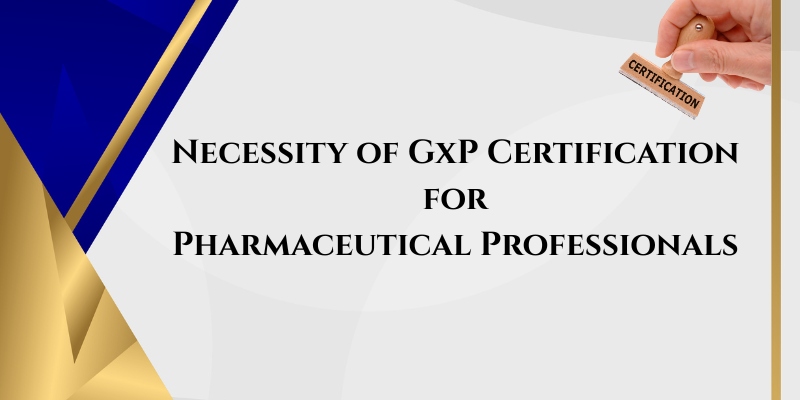In the highly regulated world of pharmaceuticals, biotechnology, medical devices, and food manufacturing, adherence to strict quality guidelines is not optional—it is mandatory. These guidelines are collectively known as Good Practices (GxP).
For professionals working within or aiming to enter these industries, a GxP certification course provides the essential knowledge base needed to ensure product safety, integrity, and compliance. This article explores what GxP encompasses, defines the certification process, and explains why this training is critical for both individual careers and organizational success.
What is GxP?
GxP is a general term encompassing various “Good Practices” required by regulatory agencies worldwide, such as the U.S. Food and Drug Administration (FDA) and the European Medicines Agency (EMA).
The “G” stands for Good, the “P” stands for Practices, and the “x” is a placeholder for the specific field to which the practices apply. The underlying philosophy of all GxP standards is the need for consistent, traceable, and documented processes to ensure the quality, safety, and efficacy of products that impact public health.
Key Topics Covered by GxP:
A comprehensive GxP certification course will delve into the specific requirements of the major disciplines:
| GxP Standard | Focus Area | Key Requirements Taught |
|---|---|---|
| GMP (Good Manufacturing Practice) | Manufacturing of pharmaceuticals. | Facility design, equipment calibration, hygiene, documentation (batch records), and quality control systems. |
| GLP (Good Laboratory Practice) | Non-clinical laboratory testing. | Study conduct, test material control, standardized operating procedures (SOPs), and data integrity. |
| GCP (Good Clinical Practice) | Clinical trials involving human subjects. | Ethical conduct, informed consent, data management, and the protection of patient rights. |
| GDP (Good Distribution Practice) | Storage and movement of drugs and medical devices. | Ensuring product quality is maintained during transportation (e.g., temperature control, security, traceability). |
| GVP (Good Pharmacovigilance Practice) | Monitoring and detection of adverse effects post-market. | Reporting procedures, risk management, and continuous safety monitoring. |
2. What is GxP Certification?
A GxP certification is a formal credential that validates an individual’s proficiency and understanding of the regulatory requirements and quality systems mandated by global health authorities.
Purpose of Certification:
- Structured Learning: Certification courses organize complex regulatory requirements into digestible, practical modules.
- Validation of Knowledge: Upon successful completion of the course and a final examination, the individual receives a certificate, formally recognizing their expertise in specific GxP areas (often focusing on GMP, as it is the broadest requirement).
- Demonstrating Competency: The certification signals to employers and regulatory auditors that the staff member has received current, standardized training necessary to perform their duties in a compliant manner.
These courses typically involve modules covering regulatory agency expectations, quality system management (QMS), documentation control, and case studies illustrating common regulatory pitfalls.
3. Why GxP Knowledge is Necessary?
GxP compliance is fundamentally necessary because it serves as the foundation for patient safety and consumer trust. The necessity can be viewed from two perspectives: organizational necessity and individual career necessity.
Necessity for the Organization
For any organization operating in a regulated sphere, GxP is the difference between operational success and catastrophic failure.
- Regulatory Compliance: GxP standards are legally enforced. Non-compliance results in severe consequences, including warning letters, hefty fines, mandatory product recalls, facility shutdowns, and even criminal prosecution. Trained staff are the best defense against these outcomes.
- Product Quality and Safety: GxP ensures that every step of the process—from raw material testing to final distribution—is controlled and documented. This minimizes the risk of error, contamination, or inconsistencies that could harm the end-user.
- Audit Readiness: Companies with GxP-certified personnel are inherently better prepared for internal and external regulatory audits (like FDA inspections). Staff understand the requirements for documentation and can confidently demonstrate compliance.
- Global Market Access: Adhering to recognized global GxP standards (which are largely harmonized internationally) is a prerequisite for selling products across borders.
Necessity for the Individual
In a competitive job market, GxP certification provides a significant professional advantage.
- Competency: Roles in Quality Assurance (QA), Quality Control (QC), Regulatory Affairs, Validation, and Production often require proof of GxP knowledge. A formal certification immediately makes a candidate more attractive.
- Career Advancement: For those already employed, GxP certification is often a key requirement for promotion into managerial or supervisory roles where oversight of compliance procedures is essential.
- Building a Culture of Quality: Professionals trained in GxP become champions of quality within their organizations, driving continuous improvement and ethical standards in the workplace.
The GxP certification course is an indispensable tool for anyone involved in developing, testing, manufacturing, or distributing regulated products. By mastering these “Good Practices,” professionals ensure the integrity of their data, the quality of their products, and the safety of the public, thereby securing their own career path in a thriving, essential industry.
Recommended: GxP Certification Courses

